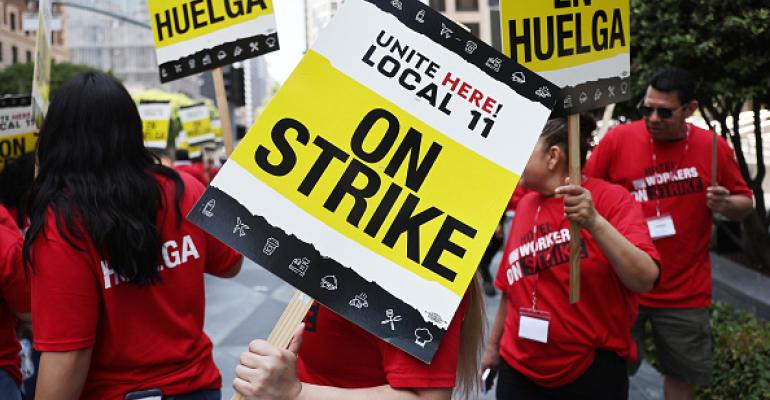In the Los Angeles International Airport area, several thousand hotel workers walked off the job on July 10. The workers’ union, UNITE HERE Local 11, calls the action the “second wave” of a multi-hotel strike in Southern California.
The first three-day strike affected 19 hotels over the recent July 4 holiday weekend. While no progress was reported in the negotiations between the hotels and union, front-desk agents, bellhops, cooks, servers, and other hotel employees reported back to work on July 5.
Among the hotels affected by the latest strike are the 803-room Sheraton Gateway Los Angeles, with 56,834 square feet of meeting space, and the 747-room Westin Los Angeles Airport, with 56,170 square feet of meeting space. Workers are also picketing the Fairfield Inn, Holiday Inn, Hotel June, Aloft, Four Points, and other properties in the LAX area.
According to the union, of the 60 properties in Southern California whose contracts expired at the end of June, only the Westin Bonaventure has reached an agreement with workers for higher wages and better working conditions.
Can Planners Claim Force Majeure?
For meeting professionals, striking hotel workers present at least two significant challenges. First, there’s the possibility that hotel services will be interrupted, creating a less-than-ideal meeting environment. Second, some host organizations and/or the attendees expected at their meetings may be uncomfortable or unwilling to cross a picket line.
A hotel strike, or the threat of a strike, creates a level of uncertainty that many planners may not be willing to tolerate, especially for high-value meeting and events. In those cases, a well-written force majeure clause might allow the group to cancel their contract without penalty. Tyra Warner, department chair for Hospitality, Tourism, & Culinary Arts at College of Coastal Georgia and former meetings-industry attorney, explains in this MeetingsNet article that a force majeure clause can expand protections beyond legally defined “acts of god.” Here are two tips:
• Specify how far out you can terminate the contract without liability if a situation arises that will negatively affect your meeting. The way that many force majeure clauses are written, hotels are protected up until the meeting date. So, for example, if a hotel strike is in progress, a group would not be able to claim force majeure until the day of the event if things aren’t resolved and service is interrupted. By that time, it’s too late to relocate.
• Include the word “impracticable,” along with “illegal” and “impossible,” in the contract language. Impracticable means it doesn’t make business sense to go forward with the meeting. For example, the force majeure language could state that it applies to “any situation beyond the parties’ control that makes it impossible, illegal, or impracticable to hold or host the meeting; prevents [at least] 25 percent of attendees from being able to attend the meeting; or otherwise materially affects a party’s ability to perform its obligations under this Agreement.”
Read the full article on effective force majeure clauses, including a sample contract clause, here.





